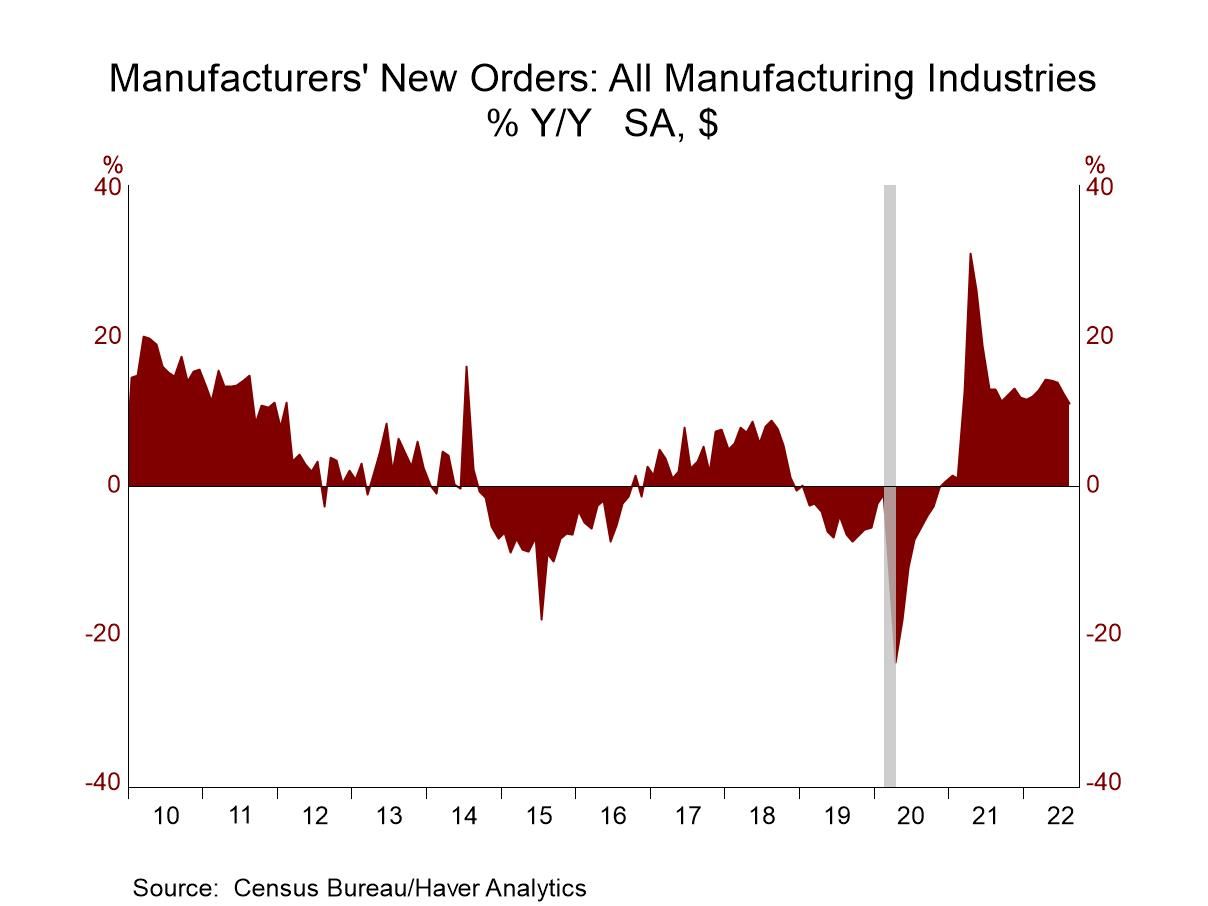U.S. Factory Orders Hold Steady but Backlogs Rise in August
by:Tom Moeller
|in:Economy in Brief
Summary
- Durable goods orders slip, but nondurables orders rise.
- Shipments rise broadly.
- Unfilled orders increase but inventories dip.


Total factory orders remained fairly steady (11.2% y/y) in August after falling an unrevised 1.0% during July. The latest figure was as expected in the Action Economics Forecast Survey. Shipments excluding the transportation sector rose 0.2% (10.5% y/y) following a 1.1% July decline.
Durable goods orders slipped 0.2% (+8.8% y/y) in August after easing 0.1% in July. The decline matched the figure in the advance report issued last week. The decline reflected a 1.1% drop (+14.7% y/y) in orders for transportation equipment, pulled down by an outsized drop in commercial aircraft orders. Orders for furniture & related products weakened 0.8% (+1.7% y/y) and fabricated metals orders fell 0.7% (3.7% y/y). To the upside, primary metals orders rose 0.6% (6.5% y/y). Electrical equipment, appliances & components increased 1.6% (9.1% y/y), accompanied by a 0.3% rise (7.3% y/y) in machinery orders. Orders for computers electronic products rose 0.7% (6.2% y/y).
Total shipments rose 0.5% (12.2% y/y) in August after falling 0.9% in July. Excluding transportation, shipments improved 0.2% (11.4% y/y) following a 1.3% July decline. Shipments of durable goods rose 0.8% (10.8% y/y). Shipments of electrical equipment & appliances strengthened 2.5% (10.4% y/y) and transportation equipment shipments rose 2.0% (16.5% y/y). Shipments of primary metals improved 0.3% (7.1% y/y) while shipments of computers & electronic products gained 0.4% (8.1% y/y).
Nondurable goods shipments, which equal nondurable goods orders, rose 0.2% (13.6% y/y) in August after falling 1.9% in July. The rise was led by basic chemical shipments which rose 0.9% (6.3% y/y) while plastic & rubber product shipments gained 0.7% (7.8% y/y). Paper product shipments improved 0.2% (2.0% y/y) while shipments of food products improved 0.1% (4.9% y/y). These gains were offset by a 1.1% weakening (+45.9% y/y) in shipments of petroleum & coal products. Apparel shipments declined 1.4% and were unchanged y/y.
Unfilled orders rose 0.5% (6.9% y/y) in August after a 0.7% increase in July. Excluding transportation, unfilled orders rose 0.3% (5.2% y/y), the same as in July. The August gain in unfilled orders was led by 1.0% rise (12.5% y/y) in electrical equipment, appliances & components. Transportation equipment backlogs rose 0.6% (8.1% y/y) but those of furniture & related products fell 0.6% (-1.6% y/y). Machinery backlogs rose 0.6% (8.4% y/y) and unfilled orders of primary metals gained 0.2% (-0.7% y/y).
Inventories edged 0.1% lower (8.8% y/y) in August after remaining fairly steady in July. Excluding transportation, inventories declined 0.2% (+10.4% y/y) after holding steady in July. Inventories of durable goods rose 0.2% (8.0% y/y), while inventories of nondurable goods fell 0.7% (+10.0% y/y), led by a 6.1% decline (+26.3% y/y) in petroleum & coal inventories.
The factory sector data are available in Haver's USECON database. The Action Economics Forecast Survey is in the AS1REPNA database.


Tom Moeller
AuthorMore in Author Profile »Prior to joining Haver Analytics in 2000, Mr. Moeller worked as the Economist at Chancellor Capital Management from 1985 to 1999. There, he developed comprehensive economic forecasts and interpreted economic data for equity and fixed income portfolio managers. Also at Chancellor, Mr. Moeller worked as an equity analyst and was responsible for researching and rating companies in the economically sensitive automobile and housing industries for investment in Chancellor’s equity portfolio. Prior to joining Chancellor, Mr. Moeller was an Economist at Citibank from 1979 to 1984. He also analyzed pricing behavior in the metals industry for the Council on Wage and Price Stability in Washington, D.C. In 1999, Mr. Moeller received the award for most accurate forecast from the Forecasters' Club of New York. From 1990 to 1992 he was President of the New York Association for Business Economists. Mr. Moeller earned an M.B.A. in Finance from Fordham University, where he graduated in 1987. He holds a Bachelor of Arts in Economics from George Washington University.
More Economy in Brief
 Global| Feb 05 2026
Global| Feb 05 2026Charts of the Week: Balanced Policy, Resilient Data and AI Narratives
by:Andrew Cates






